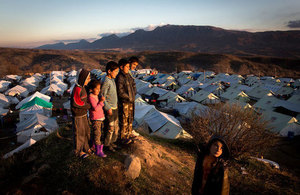Reviews set out UK vision for an open, modern development system
New Bilateral and Multilateral Aid Reviews set out a vision for global development that will tackle the challenges of the 21st century.

Picture: Andrew McConnell/Panos/DFID
The UK will champion an open, modern and innovative approach to development that will effectively tackle the global challenges of the 21st century while delivering the best results for the world’s poorest which is in our national interest, the International Development Secretary Priti Patel set out in two reviews launched today (1 Dec 2016).
Raising the standard: The Multilateral Development Review 2016 and Rising to the challenge of ending poverty: The Bilateral Development Review 2016 establish how the UK will address the global response to problems that threaten us here at home such as the migration crisis, cross-border conflict, climate change and disease pandemics.
In the reviews, the International Development Secretary makes clear that Britain’s aid contribution is an investment in our future security and national interest.
In an extensive and detailed look at the UK bilateral and multilateral development systems, the reviews confirm the geographic regions of focus for the UK, which multilateral organisations the Department for International Development (DFID) will work with, and the tools that will be used to maximise our impact as we tackle poverty across the globe.
The reviews highlight best practice in the global development system, as well as examples of poor performance that will face urgent action.
The UK is clear in its demand for high performance across the board and will maintain pressure on multilateral organisations and NGOs to ensure results, value for money, transparency and accountability.
International Development Secretary Priti Patel said:
From leading the international response to the Ebola outbreak in Sierra Leone to getting lifesaving humanitarian aid to millions of people in Syria, UK aid supported by the British public has had an incredible impact on helping the world’s poorest people.
But the global approach to development needs to adapt and reform to keep pace with our rapidly changing world. As a world-leader, the UK will be at the forefront of these efforts: promoting pioneering investment in the most challenging and fragile countries, making greater use of cutting-edge technology, and sharing skills from the best of British institutions from the NHS to our great universities.
Improving the way the UK delivers aid along with our multilateral partners is vital to deliver the best results in fighting poverty and value for taxpayers’ money.
Global Britain is outward looking and we will use our aid budget to help build a more stable, more secure, and more prosperous world for us all: this is not only the right thing to do – it is firmly in our interests.
Bilateral Development Review 2016
The Bilateral Development Review 2016 focuses on how the UK can deliver the best results on the ground for the world’s poorest people.
Key features of the Bilateral Development Review include:
- The UK is calling for further transparency and even stronger measures on value for money, for both the UK and its NGO partners. The international aid system as a whole must become more effective, transparent and accountable to the poorest people in the world, and to taxpayers.
- The UK’s bilateral development programmes will focus on security, migration, people with disabilities, health, and ending the reprehensible practices of modern slavery and child exploitation. The UK will ensure these priority areas are consistently considered in all areas of work.
- The UK will tackle the major global challenges of the 21st century by strengthening global health security, creating job opportunities and making the best use of technology and research. As set out in the UK’s Aid Strategy, 50% of DFID’s spending will go to fragile states and regions, including in the Middle East and Africa.
- In the foreword, the International Development Secretary sets out how the UK will continue to speak out against outrages in Syria and harness the spirit of urgency and impact that the UK showed during the Ebola crisis and apply it to the even greater task of eradicating extreme poverty.
Multilateral Development Review 2016
Britain’s support to multilateral development agencies will build on work which in 2014 immunised 56 million children in some of the world’s poorest countries, helped 10.4 million young people living through humanitarian emergencies to access education and provided access to clean water for 27.8 million people.
Key features of the Multilateral Development Review include:
- By encouraging multilateral agencies to collaborate, the UK has helped secure significant results while ensuring value for money. For example, Gavi, the Vaccine Alliance, worked with UNICEF to order vaccines in bulk, which has saved around £900 million over the past 5 years. Gavi’s UK-backed vaccine programmes saved the lives of more than 4 million children between 2011 and 2015.
- Reviewing the multilateral system has real impact. For example, the Food and Agriculture Organization (FAO) was put into special measures after the 2011 Multilateral Aid Review. Since then, they have modernised their management structure and delivered over US$100 million of efficiency savings between 2011 and 2015 and their performance is ranked as ‘good’ in this year’s review.
- The UK government expects and insists that every penny of taxpayers’ money is spent in an efficient, transparent and demonstrably effective way. DFID is therefore introducing improvement plans for poor performing agencies.
UK aid spend will continue to be reviewed and partners will be held to account to make sure the international development system is delivering the best results for the world’s poorest and the best value for the UK taxpayer.
Find out more
General media queries (24 hours)
Email mediateam@dfid.gov.uk
Telephone 020 7023 0600
If you have an urgent media query, please email the DFID Media Team on mediateam@dfid.gov.uk in the first instance and we will respond as soon as possible.